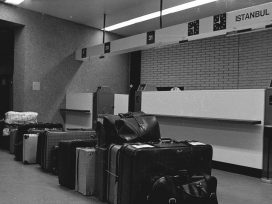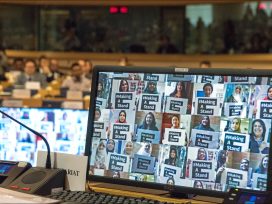Wars usually only get named after they are over. Most often, naturally, they are named by the victors – though the losers often have the best songs about them. Frequently there is, even in retrospect, no agreement about the name, or indeed the dates (many Americans think the Second World War started in 1941; for Chinese, it began in 1931). Sometimes the names are silly – the War of Jenkins’ Ear, the Football War – or are hopelessly but deliberately vague, as with Northern Ireland’s “Troubles”.
 Things are naturally trickier still when there’s dispute over whether there even is a war. Have we (whoever “we” are) been engaged in one since the morning of 11 September 2001? If so, who is fighting, and what about? The rapidly adopted North Atlantic coinage of “the War on Terror” has been thoroughly, repeatedly demolished and even mocked, as has its more grandiose sibling the “War of Civilisations”. Jason Burke, in the most ambitious overview of the past decade’s conflicts so far attempted, suggests “The 9/11 Wars” – note the plural – but actually argues that we’ve mainly experienced a very loose, multi-layered assemblage of local and regional conflicts. Gilles Kepel thinks the crucial conflict has been a “War for Muslim Minds”. Numerous writers – more often polemical than analytical – write of “Global Jihad”, but the more thoughtful among them almost all question whether something truly global and singular is really at issue. For some people – a fringe, but not one it’s safe to ignore intellectually, let alone politically – what is at stake is a war (indeed a Crusade) in defence of white, Christian Europe. Norwegian mass murderer Anders Behring Breivik’s vast online compendium of such viewpoints, which he entitled 2083: A European Declaration of Independence, is here revealing and symptomatic in its very extremity.
Things are naturally trickier still when there’s dispute over whether there even is a war. Have we (whoever “we” are) been engaged in one since the morning of 11 September 2001? If so, who is fighting, and what about? The rapidly adopted North Atlantic coinage of “the War on Terror” has been thoroughly, repeatedly demolished and even mocked, as has its more grandiose sibling the “War of Civilisations”. Jason Burke, in the most ambitious overview of the past decade’s conflicts so far attempted, suggests “The 9/11 Wars” – note the plural – but actually argues that we’ve mainly experienced a very loose, multi-layered assemblage of local and regional conflicts. Gilles Kepel thinks the crucial conflict has been a “War for Muslim Minds”. Numerous writers – more often polemical than analytical – write of “Global Jihad”, but the more thoughtful among them almost all question whether something truly global and singular is really at issue. For some people – a fringe, but not one it’s safe to ignore intellectually, let alone politically – what is at stake is a war (indeed a Crusade) in defence of white, Christian Europe. Norwegian mass murderer Anders Behring Breivik’s vast online compendium of such viewpoints, which he entitled 2083: A European Declaration of Independence, is here revealing and symptomatic in its very extremity.
On the face of it, it’s hard to sustain claims that the past decade has witnessed a novel kind of global conflict. The world is, overall, less violent now than it was at almost any point since at least the 1930s. There were more and bloodier wars across the globe in the years before 9/11 than since; and however bad things have been in Iraq and Afghanistan they have not matched the levels of slaughter experienced during the 1990s in Rwanda, Sudan, Congo and Yugoslavia. The United Nations, and various European, African and other regional organisations, have developed peacekeeping and -making mechanisms which, however patchy in their application, are more effective than anything ever seen before. Structures of international justice too, if again painfully uneven in effect, are unprecedentedly robust. The fact that every single major suspected war criminal from the conflicts in former Yugoslavia has now been caught is surely of enormous, positive global significance.
Citizens of the United Kingdom, too, are statistically much safer from violent attack than in previous recent decades. The number of UK lives lost to terrorist attacks since 9/11 is a small fraction of that saved by the (almost-) ending of Northern Ireland’s war. In the past decade, as during the Cold War – which was so murderously “hot” across much of what was then called the Third World – violence and mass suffering are nearly always somewhere else. And of course arguably every current violent threat pales into near-insignificance when set against removal of the prospect of nuclear annihilation, which hung over us all from 1945 until the 1990s.
Yet that’s not how it feels for most of us. We feel more, not less endangered than when we were young, or when our parents were. The reasons are multiple, and mostly pretty obvious. Above all, whether we think that across the past decade we’ve had a global war, or several local ones, or none, it can’t be doubted that the rhetoric of war has been almost ubiquitous. And that has included pervasive assertions of a war of ideas, a great conflict of narratives, a clash of discourses. Its effects are, in local terms, maybe best indicated by a single, glaring but easily forgotten shift in language and perception. Once upon a time, Britain’s inhabitants included several hundred thousand Pakistanis and Bangladeshis – or people with family origins in those countries – plus smaller but significant communities of Egyptians, Turks, Somalis and many more. Remarkably, they have all vanished in the past decade or so. In the places where they used to live, a completely new set of people has replaced them: people called Muslims. This vast act of ethnic cleansing has happened silently, almost without remark.
Perhaps the greatest political and intellectual change since 9/11, then, has been this: the reinvention of Islam, both by many of its adherents and by those who view it from outside, and often with fear or hostility. That change has not come only since, let alone because of, 9/11. It had been in process, more slowly, unevenly and hesitantly, for some time: in Britain, arguably at least since the Satanic Verses controversy. But in the new century it seemed suddenly to accelerate, to become global and ubiquitous. The idea of a worldwide Islamic ummah, as something far more than a simple religious attachment, indeed something like a “people” or a “nation”, politically self-conscious, essentially uniform (at least in some versions) across both time and space, took hold. Like Communism, but unlike almost any other “alternative” to capitalist modernity, political Islam came to be seen as a supposedly rival universalism to that (or those) of the West. In that, it stands virtually alone – and certainly in unique prominence. And even though Islamism evidently functions in many parts of the world as a form of – or perhaps surrogate for – cultural nationalism, the central thrust of the ideology is determinedly antinationalist, decreeing loyalties far more inclusive and compelling than any more localised identity-claim.
Almost every informed observer has protested that this reconstructed “Islam” is a myth, as dangerous as it is mistaken. They’ve pointed out that it is quite new and thoroughly contemporary, not historically pre-given: a product of globalisation, of mass migration, of novel information and communications technologies, of new kinds of educated elites, not least of rival, self-interested political rhetorics. “Islam” in almost any of the senses the word is so promiscuously tossed around, they have protested, is simply not a coherent or meaningful object of socio-political analysis. A mythical Islam has apparently acquired a kind of immunity from the demands of contextualisation, of attention to internal diversity and change and to structural determination, which are posed to historical and social studies of almost all other ideological formations. In a period when “imagined communities”, “invented traditions” and the “social construction of knowledge” are the commonplaces and even cliches of contemporary intellectual work, Islam became widely exempt from these elementary stipulations.
All this takes its place in what is by now a tradition, indeed virtually an industry, of the critical debunking of Western knowledges about “the Other”. Western Orientalists and their successors, the contemporary ideologues of civilisational conflict, of the War on Terror, of “Eurabia” and so on are accused by radical and “Third World” scholars of essentialising an ahistorical Islam. But – and here is the most disconcerting and dangerous twist – political Islamists too insist on the irresistible socio-cultural unity of the ummah. Islamist self-perceptions and presentations, especially but not only those of “fundamentalists”, closely match the procedures of their most hostile or simple-minded opponents.
They are almost by definition wedded to belief in a singular, essentially timeless Islamic character, and that any attack on Muslims anywhere (or on their own ideas) must come from hatred of that character. Nowhere else in modern history has what Pakistani-born writer Sara Suleri aptly called “alteritism” – obsession with the markers of proclaimed difference – become more pervasive than in relation to Islam: both among its dogmatic opponents and its self-appointed partisans.
Disturbingly, this mindset, once mostly the preserve of a handful of intellectuals and ideologues, has thus so rapidly become so widely generalised, both among many “ordinary” Muslims – albeit probably still more in Islington than in Islamabad, more in Rochdale than in Ramallah – and among those who hate them. Some of the ideologues’ claims, intellectually and historically near-groundless though they are, threaten still to be selffulfilling. This can be seen at its starkest in the huge corpus of recent polemic on the “Islamisation of Europe”, the writings of people like Oriana Fallaci and Lee Harris, Andrew Bostom and Robert Spencer, Bat Ye’Or, Melanie Phillips and Christopher Caldwell (though it should be acknowledged that Caldwell’s is the least blatantly bigoted, most seemingly level-headed work in this genre): and in their mutant offspring, Anders Behring Breivik.
When Breivik proclaims, as he has repeatedly done, that his inspiration and historical analogue is not Hitler but Sitting Bull, defending the homeland against invading, imperialist hordes, he reflects a worldview which, only in less obviously deranged forms, has deep roots and wide, possibly still widening purchase.
Yet the mirror-image, too, is not far to seek; and not only among the “thinkers” of al-Qaeda, al-Shabaab, or al-Muhajiroun. It can be found for instance among all those – astonishingly numerous and varied – writers arguing the implausible case that the end of Islamic rule in Spain, over five centuries ago, is and should be a living reality in “Muslim” hearts today. We find it, to cite a peculiarly depressing current instance, in Brown Skin, White Masks, a little book just published by Iranian-born, New York-based scholar Hamid Dabashi. It is a bitter, twisted diatribe against the “comprador intellectuals” and “house Muslims” who dare to criticise Iran’s revolution (Azar Nafisi’s Reading Lolita in Tehran is the most recurrent target of his obsessive rage) or political Islam. For all the erudition a man like Dabashi has shown across many previous books, all the privilege he has as a senior professor at Columbia – and more important, all the intellectual and moral capital of an anticolonialist tradition symbolized by the name of Frantz Fanon, from whom Dabashi takes his title – to end up with this kind of flailing fury is genuinely frightening as well as unsettling.
In these emotionally disturbed rhetorics, from both sides, we can thus perhaps see how the idea of a global “9/11 War” is fed not only by the fairy-tale constructs of “Islam” and “the West”, but by their association with older and more intellectually substantial ideas about imperialism and anti-imperialism. The febrile, multidirectional post-9/11 debates about a new American Empire have peaked and subsided: even if that diminuendo is, one suspects, driven less by the shift from Dubya’s to Obama’s foreign policy thinking, or even semi-withdrawal from Iraq, than by the disastrous weakness of the US economy. But the idea that political Islamists, or even the world’s Muslims as a collective, are engaged in a global, epochal struggle of the oppressed against Western imperialism remains very much alive, perhaps still growing, although the bloody physical manifestations of such struggle have (as Jason Burke and others show) been in decline. It will, surely, now persist not only so long as the USA, and Britain, remain globally interventionist powers, but so long as there is no just resolution for Palestinian national grievances, for the Israeli-Palestinian conflict remains what it has always been: the emotional as well as geopolitical heart of all the multiple antagonisms.
Yet equally, to keep on thinking of any or all of these struggles as ones of oppressed or exploited Muslims, rather than of Palestinians, or Kashmiris, Chechens, Afghans and so on – or, better and more productively, of poor, disempowered, mostly darker-skinned people against richer and more powerful ones – remains a gross political, moral, historical error. It is an error into which all too much of the global Left (whatever exactly we mean, now, by that) fell across the past decade. There is, simply, no good historical reason for thinking that either the effects of colonialisms past, or those of global power structures today, weigh more heavily on Muslims worldwide than on other (formerly) colonised people.
There is even a good case to be made, as Marnia Lazreg has done for contemporary Algeria, for thinking of Islamism itself as a colonising force. Islamists turn “colonialism” into an ahistorical, demonised category with which all their opponents and especially the postcolonial state are identified – but their own project, so alien to the lived reality of Algerian Islam across centuries, is itself one of cultural and psychological colonialism, very like the erstwhile French “civilising mission” in the same places. If we search for intellectual resources to understand, or to combat, imperialism and its legacies today, we will not find much at all in Islamist philosophy, when set against the older, secular, leftist traditions of thinking against empire, or for instance current Latin American debates on “decolonial” thought. We are certainly less likely, then, to fall into the pit which, again, some Western radicals did after 9/11: drifting into tactically and morally mistaken alliances with Islamists, scorning the very language of universal human rights, maligning the international institutions and agreements which tried – with some success since the 1990s, as we’ve seen – to implement those rights.
Maybe, too, we’d be less prone to the equal-and-opposite trap of ahistorical, crude, even hateful ideas about an “Islamic imperialism” which supposedly embraces everyone from Abbasid and Umayyad emperors to Bin Laden, or even the Somali asylum-seeker and the Mirpuri taxidriver who lives down the road. The consequences of that idea, from political murder in Norway to Tea Party-style ultra-patriotism and xenophobia in America, are no less retrograde and scary than are those of the most extreme Islamists. Maybe the most basic and crucial, albeit hardly novel, intellectual move now to make, ten years on from the Twin Towers, is to resolve that “Islam”, as a singular noun, or “Muslims” as a collectivity are simply not good things to think with or about, let alone for or against.
The caveat that all collective identities are potentially oppressive and dangerous, not just religious, and not least national, ones, surely requires little reiteration. Even so, personally, I’d quite like to see the past decade’s wave of ethnic cleansing reversed. That is, I have no objection at all to Muslim neighbours, friends, fellow citizens – but given the choice, on the whole I’d prefer to get rid of them, and bring back the Sylhetis and Somalis, Turks and Tunisians I used to live with.






